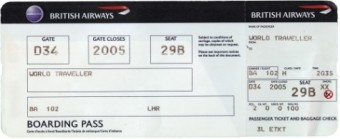План изучения темы:
-
Работа с активным словарем по теме.
-
Работа с текстом по теме.
-
Выполнение послетекстовых упражнений.
-
Выполнение грамматических упражнений.
Работа с практическим материалом по подтеме «Телефонный разговор».
Exercise 1. Translate into Russian:
Phone box, phone book, mobile phone, phone card, fax machine, answering machine, engaged, dial a number, leave a message, phone back, Directory Enquiries, reverse charge call, local call, long distance call, codes, to connect, digit, tone, direct, hands-free, extension, wrong number, units, receiver, operator.
Exercise 2. Read the text, translate it into Russian and then answer the question:
What are your successive actions if you want to call your friend from a phone both?
THE TELEPHONE
The telephone is a necessary means of communication in every day life and in business. If for instance, you want to telephone your friend (or call 11, ring him, give him a ring), you dial his phone number which can be found in the directory. If it is a long-distance call, you may have to ask the operator to connect you.
The phone will ring, and if your friend is at home he will answer by picking up the receiver. If he is busy he may ask you to call back later. If he doesn’t want to speak to you, he may hang up if he is already on the phone when you call him, his num-engaged (busy — A.E.) and you can’t get through. A telephone in a public place is a phone box (booth) or pay phone. To place a local call, pick up the receiver. You will hear a constant (dial tone). Deposit the coins into the slot. When you have deposited the correct amount of charge, you will hear a short beeping signal. When the constant tone returns, dial the number you wish to reach.
In the USA numerous telephone numbers — mostly related to businesses or governmental offices — are prefixed by 800 numbers. These numbers provide free customer service because many companies are interested in getting new customers. If you dial an 800 number, your party will pay the bill. Such calls are toll-free calls. To place an emergency telephone call (ambulance, police, fire), dial 911 or 0. These are also toll-free calls.
Pay phones have numbers in the United States. If you want, anyone can call you at a phone booth. In the USA an office worker, or a clerk, at a bank, hotel or any other institution after picking up a receiver first identifies the institution and then starts talking with a customer.
Say whether the following statements are true or false:
1. In the USA telephone numbers related to businesses or governmental offices — are prefixed by 900 numbers.
2. Such calls are toll-free calls.
3. To place an emergency telephone call dial 911 or 0.
4. In the USA an office worker or any other institution after picking up a receiver first starts talking with a customer.
Exercise 3. Use the list of word choices to answer the following questions:
|
Charge codes connect dial digit tone direct hands-free engaged extension wrong number units receiver local message operator |
1. A call to someone in the same area is a …………………….. call.
2. To make a call to another town or country, you need to know the area, country and international …………………….. Make sure you don’t miss out a ………………… in the number.
3. If you are using a conventional phone you should pick up the ………………….. and …………………….. the number you want; perhaps you have a modern phone with a ……………………. facility.
4. If the person you have called is already speaking to someone else, you will hear a sound which tells the line is …………………….
5. You’ll get a ………………….. if you aren’t careful and make a mistake.
6. When the phone rings at the other end you will hear a ringing ………………….
7. Nowadays, you can call most countries ………………… and you don’t need to ask the ……………………. to ………………….. connect you.
8. Some companies have an answering machine where you can leave a ………………….
9. If you reach a switchboard, you will have to ask for the …………………… you require.
10. The cost of a call depends on how long, where and when you phone. The cost is known as a ………………….. and it is calculated in …………………..
Exercise 4. Answer these questions:
a) What is the emergency number for the police, fire brigade or ambulance?
b) Is there a Directory Enquiries? What number is it?
c) How often do you have to pay your phone bill?
d) Is it cheaper to phone during the night?
e) What’s the phone number of your school?
f) Have you ever made a reverse charge call? If so, who was it to?
Exercise 5. Fill in the gaps in these phone conversations with suitable words or phrases:
|
afraid back Could from hang on help in leave put ring speaking this through to up |
TELEPHONE CONVERSATION
— Bayern Pharma Travel Agency. Mr. Jones (1)________. Can I (2)________ you?
— Good morning, (3)________ is Ms White (4)________ AXA Company. (5)________ I speak (6)________ Mr. Smith?
— Yes, of course. Would you (7)________ a minute. I’ll (8)________ you (9)________.
— …….
— I am (10)________, he is not (11)________ at the moment. Would you like to (12)________ a message?
— No, thank-you. When could I call him (13)________?
— Could you please (14)________ him (15)________ tomorrow morning?
— Yes, of course. Thank-you very much. Goodbye.
— Goodbye.
Exercise 6. Read and translate the dialogue «Calling to Get a Reservation»:
A: I’d like to reserve a hotel room.
B: That should be no problem. May I have your full name, please?
A: My name is John Sandals.
B: Hello, Mr. Sandals. My name is Michelle. What days do you need that reservation, sir?
A: I’m planning to visit New York from Friday, April 14 until Monday, April 17.
B: Our room rates recently went up. Is that okay with you, Mr. Sandals?
A: How much per night are we talking about?
B: Each night will be $308.
A: That price is perfectly acceptable.
B: Wonderful! Do you prefer a smoking or nonsmoking room?
A: Nonsmoking, please.
B: Next question: Is a queen-size bed okay?
A: That sounds fine.
B: Okay, Mr. Sandals. Your reservation is in our computer. All we need now is a phone number.
A: Certainly. My phone number is 626-555-1739.
B: Thank you, Mr. Sandals. We look forward to seeing you in New York!
Exercise 7. Make up your own dialogue « Calling to get an air ticket reservation».
Exercise 8. Comment on the functions of the Participle II and translate the sentences:
1. When I came nearer I saw an excited crowd at the door of his house.
2. He says that the radio set bought by you is often out of order.
3. Another problem raised in the novel is the position of woman in society.
4. Acknowledged by the public, Mark Twain became one of the leading journalists of America.
5. At the foot of the mountain we saw a little village built by the Dutch colonists many hundred years before.
6. Thirty loaded lorries followed by six cars were moving along the road.
7. We know Byron as the author of many lyrical poems devoted to nature and love.
8. Built some hundred years ago, the house stood still intact.
9. There was nothing on the table but a few magazines brought by me in the morning.
10. He created a gallery of portraits borrowed from life itself.
Раздел № 2 «Зарубежная командировка».
Тема 2.1. «На таможне».
План изучения темы:
-
Работа с активным словарем по теме.
-
Работа с текстом по теме.
-
Выполнение предтекстовых упражнений.
-
Выполнение грамматических упражнений.
Работа с практическим материалом по подтеме «На таможне».
Exercise 1. Match the words on the left to their translation on the right:
|
passport control |
налог, таможенный сбор |
|
visa |
вносить в декларацию |
|
customs officer |
Европейский Союз |
|
channel |
таможенная декларация |
|
amount |
гражданство |
|
receipt |
паспортный контроль |
|
duty |
подлежать |
|
declaration |
проход |
|
declare |
квитанция |
|
citizenship |
количество |
|
submit |
виза |
|
EU (European Union) |
таможенник |
Exercise 2. Say whether the following statements are true or false:
1) A new hi-tech identity system examines a passenger’s ear rather than their passport as they go through immigration control.
2) Heathrow is the first USA airport to carry out such an experiment.
3) The aim of the system is to speed up the movement of passengers through the terminal.
4) Passengers who frequently fly from North America to Heathrow are taking part in a six-month trial.
5) Each passenger will have an image of their eyes’ iris stored on computer.
Exercise 3. Give the English equivalents of the following collocations:
Попадать под ограничения, осматривать (багаж), заниматься, контрабандой, таможенный сбор, таможенная декларация, таможенное, управление, личные вещи, пройти таможенный досмотр, таможенные, правила, таможенные ограничения.
Exercise 4. Read the text and translate it using the dictionary:
AT THE CUSTOMS HOUSE
The moment a traveller crosses the border their luggage is taken to the customs-house by porters. Every country has its own customs regulations, which stipulate what articles are liable to duty and what are duty-free.
Sometimes an article which falls under customs restrictions and is liable to duty is allowed in duty-free if the traveller does not exceed a certain fixed quota. These are listed in a duty-free quota list. Customs restrictions also include a prohibited articles list. This is a list of items which may not be brought into a country or taken out of it. An official paper (from the proper authorities) giving permission to take items, which fall under special customs restrictions, in or out of a country is known as an import or export license.
If the traveller has any item which comes under customs restrictions he is asked to declare it. That is, he is asked to name the item, stating its value and other particulars. The declaration is made either orally or in writing on a special form. The practice seems to vary in different countries. Upon payment of duty the traveller is given a receipt. As a rule personal effects are duty-free.
It sometimes happens that a passenger’s luggage is carefully gone through in order to prevent smuggling. The formalities at the customs-house usually take some time. Only after passing through the customs does one realize that their journey is drawing to an end (or beginning, as the case might be).
Answer the following questions:
1) What are the duties of a customs inspector?
2) What is the meaning of the question ”Have you anything to declare” one hears at the customs-house so often?
3) What is the phrase “ I have nothing to declare” mean?
4) Do customs restrictions vary in different countries?
5) Have you ever gone through a customs inspection? If so relate your experience.
6) What is a duty-free item?
7) What do we mean by saying that something is an item liable to duty?

9) What does the Customs Inspected stamp stand for?
10) Can you name some of the ‘personal effects” one usually takes along on a journey?
Exercise 5. Make up the dialogues, filling in the missing remarks:
At the Passport and the Health Check
1. Could I have your passport, please?
_______________________________________
2. Where are you going?
_______________________________________
3. How long are you going to stay?
_______________________________________
4. What’s the purpose of your trip?
_______________________________________
5. And can I see your vaccination certificate?
_______________________________________
At the Customs Office
1. _____________________________________?
That’s right. Shall I open it?
2. _____________________________________?
No, I don’t think I have.
3. _____________________________________?
Thank you.
Exercise 6. Translate these sentences into English, using the Gerund:
1. They accuse him of having robbed the house. 2. He never agreed to their going on that dangerous voyage. 3. He did not approve of her drinking so much coffee. 4. The teacher of mathematics did not approve of his pupils dreaming. 5. All the happiness of my life depends on your loving me. 6. I don’t feel like seeing him. 7. I insist on being told the truth. 8. I object to his borrowing money from you. 9. I stretched out my hand to prevent her from falling. 10. My friend succeeded in translating this difficult text. 11. She suspected him of deceiving her. 12. The poor peasant thanked Robin Hood heartily for having helped him. 13. He gave up the idea of ever hearing from her. 14. We are looking forward to seeing you again. 15. She always complains of feeling unwell. 16. He persisted in trying to solve that difficult problem. 17. The cold weather prevented the girls from going for long walks. 18. Jane thought of leaving Lowood after Miss Temple’s marriage.
Exercise 7. Use the appropriate form of the Gerund of the verbs in brackets:
1. (to speak) without (to think) is (to shoot) without aim. 2. Do you know what is peculiar about the English rule of (to drive)? 3. I’m glad to say that the lady didn’t keep us (to wait). 4. I remember (to take) to Paris when I was a very small child. 5. I strongly suspect Gerald of (to know) all about it beforehand, though he swears he didn’t. 6. Excuse me for not (to write) more at the moment. 7. She never lost the power of (to form) quick decisions. 8. He had an air of (to be) master of his fate, which was his chief attraction. 9. She denied (to see) me at the concert though I’m sure I saw her in the stalls. 10. I want to thank her for (to look) after the children while I was out. 11. He passed to the front door and out without (to see) us. 12.1 enjoy (to read) poetry. 13.1 don’t mind (to stay) here for a little while. 14. Are you going to keep me (to wait) all day? 15. They reproached us for (not to come) to the party; they were waiting for us the whole evening.
Раздел № 2 «Зарубежная командировка».
Тема 2.2. «В аэропорту».
План изучения темы:
-
Работа с активным словарем по теме.
-
Работа с текстом по теме.
-
Выполнение предтекстовых упражнений.
Работа с практическим материалом по подтеме «В аэропорту».
Exercise 1. Match the words on the left to their translation on the right:
|
your should have |
билет на рейс |
|
put your luggage up |
зарегистрироваться |
|
take |
три места багажа |
|
have a ticket |
дополнительная плата |
|
excuse me |
вам бы лучше |
|
allow |
поставить багаж |
|
cancel the flight |
брать с собой |
|
make reservation |
иметь билет |
|
ticket for flight |
извините |
|
extra charge |
отменить рейс |
|
three pieces of luggage |
летная погода |
|
flying weather |
разрешать |
Exercise 2. Complete each sentence with the appropriate word. Use the words: airline,
stewardess, flight, taking off, airline ticket, landing, pilot, boarding pass, passenger.
1. The person who looks after you during a flight is the ___________.
2. When a plane is going up into sky it is ___________.
3. When a plane is coming down from the air it is ___________.
4. ___________ is a person who travels in a vehicle (planes, trains, cars, boat etc.)
5. ___________ is a person actively involved in flying an aircraft.
6. ___________ is a document giving a passenger the authority to board an aircraft.
7. ___________ is air travel from the starting point to the final destination.
8. ___________ is a company that provides air transport services for traveling passengers.
9. ___________ is a paper needed to fly.
Exercise 3. Say whether the following statements are true or false:
1. Originally, many airports were built far away from city centres.
2. Stewardess can bring you a drink.
3. Heathrow Airport is in Egypt.
4. Stewardess flies the plane.
5. Commercial airports always get money from the government in order to operate.
6. You have to check in and get a boarding pass.
7. When the plane is taking off, you don’t need to fasten your seat belts.
Exercise 4. Read the text and answer the question: what must passengers do at the airport?
THE AIRPOR FORMALITIES
When preparing to fly, passengers are requested to arrive at the airport 2 hours before departure time. They must register their tickets, get a seat assignment, and weigh and check their luggage.
If you check excess luggage you’ll have to pay extra charge for the extra weight. Every passenger is also allowed one small carry-on bag, for instance a laptop computer or small suitcase. The rules for passengers who are traveling abroad are similar in most countries but, sometimes, there are differences.
Here are some things to remember: if, for example, you need to go through Customs, try to fill in the customs declaration before you talk to the customs officer. He will ask every passenger the same questions about whether he is carrying anything he wants to declare: like tobacco, alcohol, presents, and sums of money. Then, at the check-in counter, your ticket is looked at, your things are weighed and labeled with their destination. The next formality is filling in the immigration form and going through passport control. You write your name, nationality, permanent address and the purpose of your trip. In most countries there is also a security check when your carry-on-luggage is inspected. After fulfilling all these formalities you go to the departure lounge where you can have a snack, read a paper or buy something in the duty-free shop and wait for the announcement to board the plane.
Put the sentences in the correct order:
__ 1. go to the departure lounge
__ 2. you write your name, nationality, permanent address and the purpose of your trip
__ 3. go through passport control
__ 4. wait for the announcement to board the plane
__ 5. fill in the immigration form and
__ 6. go to the check-in counter
__ 7. check excess luggage
__ 8. arrive at the airport 2 hours before departure time
__ 9. register their tickets, get a seat assignment, and weigh and check their luggage.
Раздел № 2 «Зарубежная командировка».
Тема 2.3. « На вокзале».
План изучения темы:
-
Работа с активным словарем по теме.
-
Работа с текстом по теме.
-
Выполнение предтекстовых упражнений.
-
Выполнение грамматических упражнений.
Работа с практическим материалом по подтеме «На вокзале».
Exercise 1. Match the words on the left to their translation on the right:
|
railway station |
вагон |
|
timetable |
опоздать на поезд |
|
booking office |
купе |
|
single / return ticket |
провожать кого-нибудь |
|
to miss the train |
камера хранения |
|
car |
железнодорожная станция |
|
compartment |
скорый / прямой поезд |
|
lower / upper berth |
расписание |
|
waiting room |
носильщик |
|
left-luggage room |
билетная касса |
|
porter |
нижняя / верхняя полка |
|
inquiry office |
билет в один конец / в оба конца |
|
to see somebody off |
зал ожидания |
|
fast / through train |
справочное бюро |
Exercise 2. Complete each sentence with the appropriate word. Use the words: railway station, train, train ticket, passenger, porter, left-luggage room, waiting room.
1. ____________ is a place where a train stops to let people get on and off.
2. ____________ is a set of cars on a railway.
3. ____________ is a document allowing people to travel by train.
4. ____________ is a person who travels in a vehicle (planes, trains, cars, boat etc.).
5. ____________ is a person who carries luggage on a train
6. ____________ is a place where luggage may be temporarily stored.
7. ____________ is a place where people sit or stand until the train they are waiting for comes.
Exercise 3. Read the text and answer the questions:
BY TRAIN TO WASHINGTON
The American passenger railroad is called Amtrak. We boarded the train at Pennsylvania Station. We arrived at the station an hour before departure. As far as I remember, we paid about a hundred dollars for our one-way tickets. I checked in Rich’s big suitcase for him. It was too big and heavy to take into the car as carry-on baggage. We chose a non-smoking car. That was because I had decided to give up smoking.
After we were seated, the conductor collected tickets. He took our tickets and placed seat markers above our seats. I wondered what they were for. I saw our destination – Washington.
It took us just about three hours to reach Washington. Two hours and fifty minutes to be exact. On the train we had some pizza and cold drinks. Rich said he had always traveled by plane to Washington before. It was convenient because the airport in Washington was so close to downtown. But Union Station was literally within sight of the Capitol.
QUESTIONS:
1. When did Richard and Victor arrive at the station?
2. Why did they have to check in Richard’s suitcase?
3. How had Rich traveled to Washington before?
Exercise 4. Translate into English:
— Я собираюсь ехать в Москву в командировку.
— Когда?
— В понедельник.
— Есть прямой поезд. Он отправляется в 9 вечера.
— Замечательно. А когда он прибывает в Москву?
— В 8 часов утра.
— Это мне подходит.
— Я могу заказать вам билет.
— Спасибо. Я хотел бы купейное место, нижнюю полку.
— Хорошо. Постараюсь сделать всё возможное.
— Спасибо. Вы мне очень помогли.
Exercise 5. Answer the questions:
1. Do you often travel by train?
2. What’s more convenient: to travel by plane or by train?
3. What berth do you prefer? Why?
4. What are the duties of the guard?
5. What was your longest trip by train? Was it boring or tiresome?
6. Where is nearest ticket office?
7. Is it difficult to get a ticket?
8. How long does the trip to Moscow last?
9. Do you take food with you or do you like to have meals in the dining car?
10. Have you ever been late for your train?
Exercise 6. Ask general, special, alternative, and disjunctive questions to each sentences:
1.You study English every day. 2. She can play the piano very well. 3. He may take my telephone number. 4. They often visit their grandparents in the village. 5. The children were allowed to watch TV in the evening. 6. She likes to sing with her friends. 7. We must come at school in time. 8. The cat is in the tree. 9. You should give up smoking. 10. I worked in the camp last summer.
Раздел № 2 «Зарубежная командировка».
Достарыңызбен бөлісу:
Собираясь путешествовать на самолете, важно знать о:
- Процессе регистрации (checking in).
- Ограничениях на количество регистрируемого багажа (a limit to the amount of luggage you can check).
- Правилах относительно ручной клади (“carry-on” luggage).
- Том, что случится, если ваш багаж потерялся (what happens if the airline loses your luggage).
- Том, что означает «избыточное бронирование» (“overbooking”).
- Том, что означает «состояние готовности» (“standby”).
- Том, почему нужно приезжать в аэропорт так рано (“why you have to arrive to the airport so early”).
- Том, что случится, если вы опаздываете на пересадочный рейс (“connecting flight”).
- Том, что делать, если рейс был отменен (“flight is cancelled”).
- Том, что такое «закрытые» даты (“blackout” dates).
Об этом и многом другом вам расскажет специалист в области авиаперелетов Jen Leo. Предлагаем посмотреть следующее видео:
Basic Air Travel
- What is the process for checking in at the airport? (Как происходит процесс регистрации?) If you’ve never been to an airport before and this is your first flight (полет) there are a number of steps you need to take. You will be required to check in (зарегистрироваться), get your boarding pass (посадочный талон), check your luggage (багаж) and then proceed to the security gate (пропускной пункт) and eventually to your designated departure gate (выход на посадку). Airport check-in (регистрация в аэропорту) is when you let the airline know that you are there. The airline will have someone check your I.D. (документ, удостоверяющий личность), usually your driver’s license or your passport, they will check to see if you have any luggage with you and, if you’re going to be checking that luggage, they will then give you your boarding pass with your gate number (номер выхода на посадку) on it so you may proceed to the gate through security.
- What other types of check-in are available at the airport? (Какие еще виды регистрации доступны в аэропорту?) Curbside check-in (регистрация пассажиров при подъезде в аэропорт) is that little desk right on the sidewalk where the skycap (носильщик в аэропорту) is there ready to check you in, take your baggage (багаж), and give you your boarding pass. Sometimes, the line is a little shorter than inside at the baggage check-in desk (стойка регистрации), but it comes with a price. You’re required to at least tip (давать чаевые) the skycap or sometimes there’s a mandatory fee (обязательная плата) of two dollars per bag right there on a sign as you check in at the line. A self-service check-in («саморегистрация») is a know-it-all computer that knows who you are as soon as you put in your ID or your credit card. What you do is you verify who you are, and that you’re on the next flight and what seat you want, and then it prints out your boarding pass for you, right then and there; nobody needs to help you.
- Is there a limit to the amount of luggage I can check? (Есть ли ограничение на количество регистрируемого багажа?) There is absolutely a limit to the number of bags you can check on a plane. You can’t just move in your whole apartment with boxes and gigantic suitcases (огромные чемоданы). Usually the limit to the number of bags is two, but it varies from airline to airline. Check each airline for their own personal requirements (требования) before you book (заказывать, бронировать) your ticket. If your bags are over the weight limit (превышать ограничение веса), you will be charged (с вас возьмут деньги). Please do note that the weight allowances (норма бесплатного провоза багажа) can vary (отличаться) domestically (внутри страны) versus international. If you’re going on an international trip, and traveling through several different airlines throughout the course of your vacation, make sure you know what the bag restrictions (ограничения) are with each airline, because they do vary as you cross overseas.
- What are rules for “carry-on” luggage? (Каковы правила для ручной клади?) Usually, you’re only allotted two carry-on bags – one to go under your seat or the overhead compartment (верхняя багажная полка), and the other to be a personal item (личная вещь), such as a purse or a laptop computer. If you are one of the last people to board a plane (сесть на самолёт), sometimes you’re asked to check one of your larger pieces of luggage at the gate if the plane is already full.
- What happens if the airline loses my luggage? (Что происходит, если авиакомпания теряет мой багаж?) If you can’t find your bag once you get off the plane (выйти из самолета), know that you are not alone. This happens to a lot of passengers. What you do is go directly to the airline desk and start filling out the paperwork (заполнять документы), letting them know that your baggage has been lost. Sometimes it’s just on the flight behind you and they will deliver it to you later. Otherwise, you might have to file a claim (предъявлять претензию) and wait for reimbursement (компенсация) from the airline.
- What does «overbooking» mean? (Что такое «избыточное бронирование»?) Overbooking («избыточное бронирование») has been in the news a lot lately. All it means is that they’ve sold more tickets than there are seats for that flight, which is a scandal. Airlines often overbook (продавать больше билетов, чем имеется мест) because they like to fly full flights, so they will sell more tickets than there are seats because a few people just might not show up (объявиться). This is overbooking. If your flight is overbooked, they might ask you to give up your seat (отказаться от своего места), and if they don’t ask you to give up your seat, they might do it for you. The incentive (поощрительное вознаграждение) is they might offer you travel credit, a meal voucher (ваучер на питание) or a free ticket in exchange for (в обмен на) taking a different flight and relieving (разгрузка) the overbooking.
- What is “standby”? (Что такое «состояние готовности»?) Standby («состояние готовности») is when you have a ticket for one flight, but you want to go on an earlier flight and get to your destination (место назначения, пункт назначения) a little sooner. You check in, see if there are any other seats available on an earlier flight and wait for it. If the seats are empty, you can go standby. One tip for flying standby is to use the check-in desk (стойка регистрации пассажиров) instead of the kiosk. What you want to do is ask a live person if there is any availability on an earlier flight. They’ll be able to let you know and send you to the appropriate gate where you can get your name on a waiting list (лист ожидания). Go early, because the sooner you get there the higher up your name will be on the standby waiting list.
- Why do I have to be at the airport so early? (Почему нужно быть в аэропорту так рано?) These days it is best to arrive at least two hours early, if you are flying domestically. If you are on an International Flight (международный рейс) you want to arrive three hours early; this alleviates stress (снижает стресс) and it also gives you plenty of time to go through the security gate. You want to make sure you get to the airport early, at least two hours ahead of time, because security clearance (проверка безопасности) has been ramped up and it can take a long time to get through the security gate. With the procedures that they have today, you may need to take off your shoes, jacket and belt. You need to take your laptop out of its bag and you may have to make sure your change is in its special compartment, so you can use up to four or five trays sometimes to get through the security gate. With everybody lined up to get on their flight, this can take quite a while. This is why it is good to be at the airport early.
- What happens if I miss my connecting flight because my first flight was late? (Что происходит, если я опаздываю на пересадочный рейс, так как мой первый рейс задержался?) If you need to be re-booked (перебронировать) on a flight because you’ve missed a connection (опоздать на пересадку), you want to check with your airline provider to see if there’s another flight that you can get on for free (бесплатно). Sometimes, if there are none available and all the flights are full you might have to change airlines, and in this case you might be charged a fee (с вас могут взять плату) or even another price of a ticket. The airline is responsible if it was due to mechanical failure (из-за механической неисправности), but if it was weather and you were caught in some snowstorm for example, they are not responsible for booking you on another flight.
- If my flight is cancelled or I’m bumped, what is airline’s obligation? (Каковы обязательства авиакомпании, если мой рейс отменен, или мне не хватило места?) If the flight that you want to be re-booked on is full and you have to wait until the next day, sometimes the airline will put you up in a hotel. But if they don’t and you need to pay for it yourself, try asking the hotel (nearby an airport) for the distressed passenger discount (скидка для «пострадавших» пассажиров). Then you can maybe get a better deal on the overnight stay. If you’re bumped (если вам не хватило места) and the airline is going to offer you some compensation, try and get a cheque rather than a flight voucher (разрешение на полёты, «проездной»). Cash in hand is always better than a flight voucher because the vouchers could have blackout dates («закрытые» даты), restricting you from travelling anytime you want. Whereas, with the cash, you can use it for whatever you want, or you can re-book a brand new ticket.
- What are “blackout” dates? (Что такое «закрытые» даты?) Blackout dates are restricted days of travel. So, if you are on a discounted flight (льготный рейс), then the blackout dates are dates you cannot travel on, such as holidays or special high peak season vacation times. But these blackout dates vary from airline to airline so you want to make sure you check with your provider before you book your ticket.
- What is the standard “connection time” between flights? (Сколько составляет стандартное «стыковочное время» между рейсами?) The standard “connection time” between flights is usually about 45 minutes to an hour and a half, but if you’re traveling overseas, the “connection time” can be upwards of two, four, even five or six hours, between flights.
Итак, просмотрим еще раз основные этапы путешествия на самолете:
| Вылет (Departure) | |
|---|---|
Departure board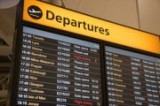 |
Приехав в аэропорт (arrive at the airport), вы можете посмотреть на доску информации о вылете (departure board), где показаны номера рейсов (flight numbers), время вылета (departure time) и пункт назначения (destination). |
Check-in desk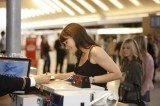 Luggage / baggage 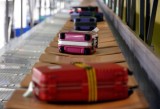 |
Необходимо зарегистрироваться (to check in). Пройдите к стойке регистрации пассажиров (check-in desk). Там взвесят ваш багаж (luggage), и, если норма бесплатного провоза багажа (weight allowances) превышена (обычно около 20 кг), то придется заплатить за багаж сверх установленной нормы (pay excess baggage). На стойке регистрации проверяют ваш билет и выдают посадочный талон (boarding card / boarding pass) на самолет с номером места. Boarding card / boarding pass |
Passport control The gate 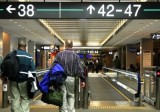 |
Затем вы проходите паспортный контроль (passport control) и направляетесь в зал ожидания (departure lounge). Здесь вы можете купить что-нибудь в магазине беспошлинной продажи (duty free). Примерно за полчаса до взлета (take-off) вы идете к выходу на посадку (gate). Departure lounge Duty free shop 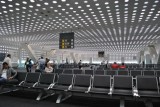  |
Overhead compartment / overhead locker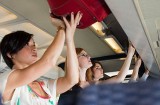 |
Сев в самолет (to board = to get on), вы находите свое место (seat). Если есть ручная кладь (“carry-on” luggage / hand luggage), вы можете положить ее под сиденье либо на верхнюю багажную полку (overhead compartment / overhead locker) над сиденьем. |
| Полет (The Flight) | |
Captain / pilot, flight attendants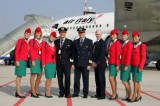 Runway 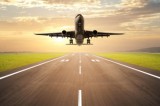 |
Пилот (captain / pilot) или бригада бортпроводников (cabin crew / flight attendants) могут сказать следующее: — поставьте спинки кресла в вертикальное положение (put your seats in the upright position); — пристегните ремни (fasten your seat belts); — выключите мобильные телефоны (switch off your mobile phones) и т. п. Внимательно слушайте информацию о правилах техники безопасности (safety instructions), запомните расположение аварийных выходов (emergency exits). Если рейс не задерживается (delay), самолет выходит на взлетную полосу (runway) и взлетает (takes off). Seat belts Emergency exit   |
| Прибытие (Arrival) | |
Customs GREEN = nothing to declare, RED = goods to declare  |
Когда самолет приземлился (landed), вы выходите (get off the plane) и направляетесь к зданию аэровокзала (terminal building), к зоне прибытия (arrivals zone), затем к месту получения багажа (baggage reclaim). Далее проходите таможенный контроль (customs): зеленый указатель – нечего декларировать, красный – товары, подлежащие декларированию (GREEN = nothing to declare, RED = goods to declare). Во многих аэропортах можно взять напрокат автомобиль (hire a car). Если перелёт осуществлялся через несколько часовых поясов (time zones), вы можете чувствовать синдром смены часовых поясов (jetlag). Arrivals Baggage reclaim   |
- А еще мы недавно опубликовали самый полный разговорник для тех, кто путешествует на самолете. Читайте и запоминайте полезные фразы.
Хорошо ли вы запомнили новую лексику? Проверьте себя, выполнив следующее задание:
Complete each sentence with the appropriate word.
- An airport … is a main building at an airport where passengers arrive and depart.
- … is the section of an airport where passengers arrive.
- Two general words for bags and suitcases are … and ….
- When you arrive at the airport, you go to … … to get your boarding pass.
- Before you get on the plain you have to show identification at … … and go through security.
- Passengers flying to another country are usually entitled to buy cheap alcohol, cigarettes, etc., from the … free shops.
- Baggage which is heavier than the weight allowed as free baggage for a certain category of tickets is called … baggage.
- The track, or ‘road’ on which an aircraft takes off and lands is called the ….
- After you arrived you go to … … to pick up your luggage.
- When you go through …, you may be asked “Do you have anything to declare?”
- The person who looks after you during a flight is the … ….
- You can usually ask for a window or aisle ….
- When a plane is going up into sky it is … ….
- When a plane is coming down from the air it is ….
- The feeling of sleepiness that affects you after you have travelled through several time zones is called ….
Key
- Terminal
- Arrivals
- Luggage, baggage
- Check-in desk
- Passport control
- Duty
- Excess
- Runway
- Baggage reclaim
- Customs
- Flight attendant
- Seat
- Taking off
- Landing
- Jetlag
Если вы нашли ошибку, пожалуйста, выделите фрагмент текста и нажмите Ctrl+Enter.
План изучения темы:
- Работа с активным словарем по теме.
- Работа с текстом по теме.
- Выполнение предтекстовых упражнений.
- Выполнение грамматических упражнений.
Работа с практическим материалом по подтеме «На таможне».
Exercise 1. Match the words on the left to their translation on the right:
| passport control | налог, таможенный сбор |
| visa | вносить в декларацию |
| customs officer | Европейский Союз |
| channel | таможенная декларация |
| amount | гражданство |
| receipt | паспортный контроль |
| duty | подлежать |
| declaration | проход |
| declare | квитанция |
| citizenship | количество |
| submit | виза |
| EU (European Union) | таможенник |
Exercise 2. Say whether the following statements are true or false:
1) A new hi-tech identity system examines a passenger’s ear rather than their passport as they go through immigration control.
2) Heathrow is the first USA airport to carry out such an experiment.
3) The aim of the system is to speed up the movement of passengers through the terminal.
4) Passengers who frequently fly from North America to Heathrow are taking part in a six-month trial.
5) Each passenger will have an image of their eyes’ iris stored on computer.
Exercise 3. Give the English equivalents of the following collocations:
Попадать под ограничения, осматривать (багаж), заниматься, контрабандой, таможенный сбор, таможенная декларация, таможенное, управление, личные вещи, пройти таможенный досмотр, таможенные, правила, таможенные ограничения.
Exercise 4. Read the text and translate it using the dictionary:
AT THE CUSTOMS HOUSE
The moment a traveller crosses the border their luggage is taken to the customs-house by porters. Every country has its own customs regulations, which stipulate what articles are liable to duty and what are duty-free.
Sometimes an article which falls under customs restrictions and is liable to duty is allowed in duty-free if the traveller does not exceed a certain fixed quota. These are listed in a duty-free quota list. Customs restrictions also include a prohibited articles list. This is a list of items which may not be brought into a country or taken out of it. An official paper (from the proper authorities) giving permission to take items, which fall under special customs restrictions, in or out of a country is known as an import or export license.
If the traveller has any item which comes under customs restrictions he is asked to declare it. That is, he is asked to name the item, stating its value and other particulars. The declaration is made either orally or in writing on a special form. The practice seems to vary in different countries. Upon payment of duty the traveller is given a receipt. As a rule personal effects are duty-free.
It sometimes happens that a passenger’s luggage is carefully gone through in order to prevent smuggling. The formalities at the customs-house usually take some time. Only after passing through the customs does one realize that their journey is drawing to an end (or beginning, as the case might be).
Answer the following questions:
1) What are the duties of a customs inspector?
2) What is the meaning of the question ”Have you anything to declare” one hears at the customs-house so often?
3) What is the phrase “ I have nothing to declare” mean?
4) Do customs restrictions vary in different countries?
5) Have you ever gone through a customs inspection? If so relate your experience.
6) What is a duty-free item?
7) What do we mean by saying that something is an item liable to duty?

9) What does the Customs Inspected stamp stand for?
10) Can you name some of the ‘personal effects” one usually takes along on a journey?
Exercise 5. Make up the dialogues, filling in the missing remarks:
At the Passport and the Health Check
1. Could I have your passport, please?
_______________________________________
2. Where are you going?
_______________________________________
3. How long are you going to stay?
_______________________________________
4. What’s the purpose of your trip?
_______________________________________
5. And can I see your vaccination certificate?
_______________________________________
At the Customs Office
1. _____________________________________?
That’s right. Shall I open it?
2. _____________________________________?
No, I don’t think I have.
3. _____________________________________?
Thank you.
Exercise 6. Translate these sentences into English, using the Gerund:
1. They accuse him of having robbed the house. 2. He never agreed to their going on that dangerous voyage. 3. He did not approve of her drinking so much coffee. 4. The teacher of mathematics did not approve of his pupils dreaming. 5. All the happiness of my life depends on your loving me. 6. I don’t feel like seeing him. 7. I insist on being told the truth. 8. I object to his borrowing money from you. 9. I stretched out my hand to prevent her from falling. 10. My friend succeeded in translating this difficult text. 11. She suspected him of deceiving her. 12. The poor peasant thanked Robin Hood heartily for having helped him. 13. He gave up the idea of ever hearing from her. 14. We are looking forward to seeing you again. 15. She always complains of feeling unwell. 16. He persisted in trying to solve that difficult problem. 17. The cold weather prevented the girls from going for long walks. 18. Jane thought of leaving Lowood after Miss Temple’s marriage.
Exercise 7. Use the appropriate form of the Gerund of the verbs in brackets:
1. (to speak) without (to think) is (to shoot) without aim. 2. Do you know what is peculiar about the English rule of (to drive)? 3. I’m glad to say that the lady didn’t keep us (to wait). 4. I remember (to take) to Paris when I was a very small child. 5. I strongly suspect Gerald of (to know) all about it beforehand, though he swears he didn’t. 6. Excuse me for not (to write) more at the moment. 7. She never lost the power of (to form) quick decisions. 8. He had an air of (to be) master of his fate, which was his chief attraction. 9. She denied (to see) me at the concert though I’m sure I saw her in the stalls. 10. I want to thank her for (to look) after the children while I was out. 11. He passed to the front door and out without (to see) us. 12.1 enjoy (to read) poetry. 13.1 don’t mind (to stay) here for a little while. 14. Are you going to keep me (to wait) all day? 15. They reproached us for (not to come) to the party; they were waiting for us the whole evening.
Раздел № 2 «Зарубежная командировка».
Тема 2.2. «В аэропорту».
План изучения темы:
- Работа с активным словарем по теме.
- Работа с текстом по теме.
- Выполнение предтекстовых упражнений.
Работа с практическим материалом по подтеме «В аэропорту».
Exercise 1. Match the words on the left to their translation on the right:
| your should have | билет на рейс |
| put your luggage up | зарегистрироваться |
| take | три места багажа |
| have a ticket | дополнительная плата |
| excuse me | вам бы лучше |
| allow | поставить багаж |
| cancel the flight | брать с собой |
| make reservation | иметь билет |
| ticket for flight | извините |
| extra charge | отменить рейс |
| three pieces of luggage | летная погода |
| flying weather | разрешать |
Exercise 2. Complete each sentence with the appropriate word. Use the words: airline,
stewardess, flight, taking off, airline ticket, landing, pilot, boarding pass, passenger.
1. The person who looks after you during a flight is the ___________.
2. When a plane is going up into sky it is ___________.
3. When a plane is coming down from the air it is ___________.
4. ___________ is a person who travels in a vehicle (planes, trains, cars, boat etc.)
5. ___________ is a person actively involved in flying an aircraft.
6. ___________ is a document giving a passenger the authority to board an aircraft.
7. ___________ is air travel from the starting point to the final destination.
8. ___________ is a company that provides air transport services for traveling passengers.
9. ___________ is a paper needed to fly.
Exercise 3. Say whether the following statements are true or false:
1. Originally, many airports were built far away from city centres.
2. Stewardess can bring you a drink.
3. Heathrow Airport is in Egypt.
4. Stewardess flies the plane.
5. Commercial airports always get money from the government in order to operate.
6. You have to check in and get a boarding pass.
7. When the plane is taking off, you don’t need to fasten your seat belts.
Exercise 4. Read the text and answer the question: what must passengers do at the airport?
THE AIRPOR FORMALITIES
When preparing to fly, passengers are requested to arrive at the airport 2 hours before departure time. They must register their tickets, get a seat assignment, and weigh and check their luggage.
If you check excess luggage you’ll have to pay extra charge for the extra weight. Every passenger is also allowed one small carry-on bag, for instance a laptop computer or small suitcase. The rules for passengers who are traveling abroad are similar in most countries but, sometimes, there are differences.
Here are some things to remember: if, for example, you need to go through Customs, try to fill in the customs declaration before you talk to the customs officer. He will ask every passenger the same questions about whether he is carrying anything he wants to declare: like tobacco, alcohol, presents, and sums of money. Then, at the check-in counter, your ticket is looked at, your things are weighed and labeled with their destination. The next formality is filling in the immigration form and going through passport control. You write your name, nationality, permanent address and the purpose of your trip. In most countries there is also a security check when your carry-on-luggage is inspected. After fulfilling all these formalities you go to the departure lounge where you can have a snack, read a paper or buy something in the duty-free shop and wait for the announcement to board the plane.
Put the sentences in the correct order:
__ 1. go to the departure lounge
__ 2. you write your name, nationality, permanent address and the purpose of your trip
__ 3. go through passport control
__ 4. wait for the announcement to board the plane
__ 5. fill in the immigration form and
__ 6. go to the check-in counter
__ 7. check excess luggage
__ 8. arrive at the airport 2 hours before departure time
__ 9. register their tickets, get a seat assignment, and weigh and check their luggage.
Раздел № 2 «Зарубежная командировка».
Тема 2.3. « На вокзале».
План изучения темы:
- Работа с активным словарем по теме.
- Работа с текстом по теме.
- Выполнение предтекстовых упражнений.
- Выполнение грамматических упражнений.
Работа с практическим материалом по подтеме «На вокзале».
Exercise 1. Match the words on the left to their translation on the right:
| railway station | вагон |
| timetable | опоздать на поезд |
| booking office | купе |
| single / return ticket | провожать кого-нибудь |
| to miss the train | камера хранения |
| car | железнодорожная станция |
| compartment | скорый / прямой поезд |
| lower / upper berth | расписание |
| waiting room | носильщик |
| left-luggage room | билетная касса |
| porter | нижняя / верхняя полка |
| inquiry office | билет в один конец / в оба конца |
| to see somebody off | зал ожидания |
| fast / through train | справочное бюро |
Exercise 2. Complete each sentence with the appropriate word. Use the words: railway station, train, train ticket, passenger, porter, left-luggage room, waiting room.
1. ____________ is a place where a train stops to let people get on and off.
2. ____________ is a set of cars on a railway.
3. ____________ is a document allowing people to travel by train.
4. ____________ is a person who travels in a vehicle (planes, trains, cars, boat etc.).
5. ____________ is a person who carries luggage on a train
6. ____________ is a place where luggage may be temporarily stored.
7. ____________ is a place where people sit or stand until the train they are waiting for comes.
Exercise 3. Read the text and answer the questions:
BY TRAIN TO WASHINGTON
The American passenger railroad is called Amtrak. We boarded the train at Pennsylvania Station. We arrived at the station an hour before departure. As far as I remember, we paid about a hundred dollars for our one-way tickets. I checked in Rich’s big suitcase for him. It was too big and heavy to take into the car as carry-on baggage. We chose a non-smoking car. That was because I had decided to give up smoking.
After we were seated, the conductor collected tickets. He took our tickets and placed seat markers above our seats. I wondered what they were for. I saw our destination – Washington.
It took us just about three hours to reach Washington. Two hours and fifty minutes to be exact. On the train we had some pizza and cold drinks. Rich said he had always traveled by plane to Washington before. It was convenient because the airport in Washington was so close to downtown. But Union Station was literally within sight of the Capitol.
QUESTIONS:
1. When did Richard and Victor arrive at the station?
2. Why did they have to check in Richard’s suitcase?
3. How had Rich traveled to Washington before?
Exercise 4. Translate into English:
— Я собираюсь ехать в Москву в командировку.
— Когда?
— В понедельник.
— Есть прямой поезд. Он отправляется в 9 вечера.
— Замечательно. А когда он прибывает в Москву?
— В 8 часов утра.
— Это мне подходит.
— Я могу заказать вам билет.
— Спасибо. Я хотел бы купейное место, нижнюю полку.
— Хорошо. Постараюсь сделать всё возможное.
— Спасибо. Вы мне очень помогли.
Exercise 5. Answer the questions:
1. Do you often travel by train?
2. What’s more convenient: to travel by plane or by train?
3. What berth do you prefer? Why?
4. What are the duties of the guard?
5. What was your longest trip by train? Was it boring or tiresome?
6. Where is nearest ticket office?
7. Is it difficult to get a ticket?
8. How long does the trip to Moscow last?
9. Do you take food with you or do you like to have meals in the dining car?
10. Have you ever been late for your train?
Exercise 6. Ask general, special, alternative, and disjunctive questions to each sentences:
1.You study English every day. 2. She can play the piano very well. 3. He may take my telephone number. 4. They often visit their grandparents in the village. 5. The children were allowed to watch TV in the evening. 6. She likes to sing with her friends. 7. We must come at school in time. 8. The cat is in the tree. 9. You should give up smoking. 10. I worked in the camp last summer.
Раздел № 2 «Зарубежная командировка».
Complete the sentences with the appropriate words and phrases from the box.
1 Life is impossible without … work.
2 Alexander tries … his working day well.
3 At 6:15 my alarm clock …
4 I usually try … as long as possible. Am la … ?
5 Good … is better than
6 I wash my face with …
7 In a common school every lesson … 40 minutes.
8 This weekend I am … doing my project.
9 At dinner all our family … at the kitchen table.
10 At 11 o’clock he … and goes to bed.
1 buzzes
2 wealth
3 busy
4 goal
5 hard
6 takes a shower
7 lazybones
8 cold water
9 canteen
10 gathers
11 flash by
12 to organize
13 health
14 lasts
15 to stay in bed
Найди верный ответ на вопрос ✅ «Complete the sentences with the appropriate words and phrases from the box. 1 Life is impossible without … work. 2 Alexander tries … …» по предмету 📙 Английский язык, а если ответа нет или никто не дал верного ответа, то воспользуйся поиском и попробуй найти ответ среди похожих вопросов.
Искать другие ответы
Главная » Английский язык » Complete the sentences with the appropriate words and phrases from the box. 1 Life is impossible without … work. 2 Alexander tries … his working day well. 3 At 6:15 my alarm clock … 4 I usually try … as long as possible. Am la … ? 5 Good ..
помогите!!!!
. Complete each sentence with one of the words or phrases below.
characters find whenever broadsheets article events
managed approve celebrated wisdom
1. … have many detailed articles about national and international events.
2. It wasn’t easy but the football team … to win the match.
3. The Times or The Daily Telegraph generally give information about … happening in London.
4. I have read the book. I … it very interesting and exciting.
5. Soap opera is a programme where one and the same … appear in everyday life situations.
6. Have you read the … about the reforms in Higher Education. It’s worth reading.
7. … I phone him he’s always out.
8. I always … of people who have their own opinion and able to defend it.
9. The … of the ancients could help our generation if we have learned from it.
10. What other holidays can be … in the same way?

